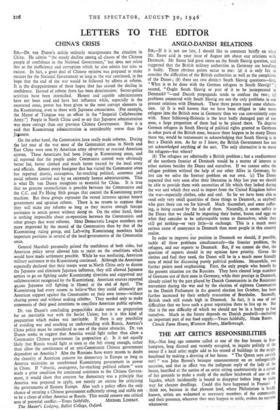ANGLO-DANISH RELATIONS SIR,-If it is not too late, I should
like to comment briefly on what Mr. Ensor said in your issue of August 9th about our relations with Denmark. Mr Ensor laid great stress on the South Slesvig question, and suggested that the British military authorities in Germany are handling it badly. Three obvious points occur to me: (a) it is only fair to consider the difficulties of the British authorities as well as the complaints of the Danes ; (b) there are two distinat South Slesvig questions—first, 'What is to be done with the German refugees in South Slesvig? "; second, "Ought South Slesvig or part of it to be incorporated in Denmark? "—and Danish propaganda tends to confuse the two ; (c) problems connected with South Slesvig are not the only problems in our present relations with Denmark. These three points need some elabora- tion. (a) It is well known that we have been obliged to take more refugees into the British zone in Germany than we can conveniently cope with. Since Schleswig-Holstein is the least badly damaged part of our zone, a large proportion of them had to be placed there. To deprive German refugees in South Slesvig of political rights granted to Germans in other parts of the British zone, because there happen to be many Danes there too, would be. tantamount to acknowledging that South Slesvig is in fact a Danish area. As far as I know, the British Government has not yet acknowledged anything of the sort. The only alternative is to move the refugees—but where?
(b) The refugees are admittedly a British problem ; but a readjustment of the southern frontier of Denmark would be a matter of interest to other nations besides the Danes and ourselves. If we cannot solve the refugee problem without the help of our other Allies in Germany, far less can we solve the frontier problem on our own. (c) The Danes expected that very soon after their liberation in May last year we should be able to provide them with necessities of life which they lacked during the war and which they used to import from the United Kingdom before the war—especially clothes, coke and coal. So far we have been able to send only very small quantities of these things to Denmark, as anybody who goes there can see for himself. Much discomfort, and some suffer- ing, is being caused by the lack of them. Naturally, it seems unfair to the Danes that we should be importing their butter, bacon and eggs on what they consider to be unfavourable terms to themselves, while they still get nothing—or very little—in exchange. This is a much more serious cause of annoyance in Denmark than most people in this country realise.
In order to improve our position in Denmark we should, if possible, tackle all three problems simultaneously—the frontier problem, the refugees, and our exports to Denmark. But, if we cannot do that, the question of exports should in my opinion have priority. Given the clothes and fuel they need, the Danes will be in a much more friendly state of mind for discussing purely political problems. Meanwhile, two further points need emphasising. First, the only people who benefit by the present situation are the Russians. They have cleared large numbers of Germans out of their zone in Germany, while their prestige in Denmark, already raised by the part played by Danish Communists in the Resistance movement during the war and by the election of eighteen Communists to the Danish Parliament in the general election last October, has been further increased by their orderly evacuation of Bornholm. Secondly, British stock still stands high in Denmark. In fact, it is one of our difficulties that we have such a great reputation there to live up to. But that is the one difficulty of which we should not be in a hurry to free ourselves. Much in the future depends on Danish goodwill—including an important part of our food supply.—Yours faithfully, MARK BAKER. Clench Farm House, Wootton Rivers, Marlborough.


























 Previous page
Previous page